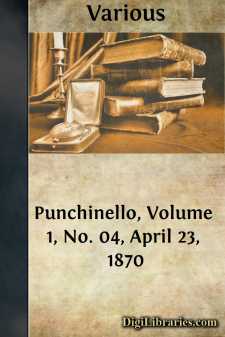Categories
- Antiques & Collectibles 13
- Architecture 36
- Art 48
- Bibles 22
- Biography & Autobiography 813
- Body, Mind & Spirit 142
- Business & Economics 28
- Children's Books 15
- Children's Fiction 12
- Computers 4
- Cooking 94
- Crafts & Hobbies 4
- Drama 346
- Education 46
- Family & Relationships 57
- Fiction 11829
- Games 19
- Gardening 17
- Health & Fitness 34
- History 1377
- House & Home 1
- Humor 147
- Juvenile Fiction 1873
- Juvenile Nonfiction 202
- Language Arts & Disciplines 88
- Law 16
- Literary Collections 686
- Literary Criticism 179
- Mathematics 13
- Medical 41
- Music 40
- Nature 179
- Non-Classifiable 1768
- Performing Arts 7
- Periodicals 1453
- Philosophy 64
- Photography 2
- Poetry 896
- Political Science 203
- Psychology 42
- Reference 154
- Religion 513
- Science 126
- Self-Help 84
- Social Science 81
- Sports & Recreation 34
- Study Aids 3
- Technology & Engineering 59
- Transportation 23
- Travel 463
- True Crime 29
Punchinello, Volume 1, No. 04, April 23, 1870
by: Various
Categories:
Description:
Excerpt
Booth's Theatre has become famous as the place where Mr. MOLLENHAUER nightly leads his admirable orchestra, and plays with exquisite skill and infinite tenderness his unrivalled violin solos.
Since this theatre opened, there have been several attempts to add dramatic entertainments to the attractive concerts given by Mr. MOLLENHAUER. Two great actors, Mr. JEFFERSON and Mr. BOOTH, have at different times appeared at this house, and in Rip Van Winkle and Hamlet have given us the most perfect specimens of dramatic monologue. Lately, there was an attempt made to present Macbeth during the intermissions in the performance of the orchestra. Had an actor been engaged who was capable of playing Macbeth, and had a company been engaged to support him, the tragedy would doubtless have been well played. There was really little else wanting to make it a meritorious Shakespearean revival.
To visit this theatre is held to be a solemn duty by a large class of respectable and serious people. They don't go for amusement—they are far too sensible for that—but they go to support the legitimate drama, to testify their respect for SHAKESPEARE and for Mr. BOOTH'S classic brow. The Worldly-Minded Persons who attended the representations of Macbeth, found themselves assisting at a scene compared with which a funeral would have been jovial, and a hanging, a wild dissipation.
This is the sort of thing that presents itself to our memory as we recall the first night of Macbeth.
A large and elderly audience enters the portals with subdued and mournful mien. The ushers, who, in imitation of Mr. BOOTH, do a little of the classic brow and curl business themselves, chew tobacco with an air of resigned melancholy, and spit upon the carpet, as though renouncing the pleasures of the world and the decencies of civilization.
At the first intermission of the orchestra, the curtain rises upon the three Weird Sisters. Mr. HIND is a Weird Sister, and he improves the opportunity to howl with a weirdness that draws an involuntary laugh from an irreverent young lady.
Respectable Father. "Laughing in BOOTH'S, my dear! I am astonished at you. Sh."
Respectable Mother. "Ellen, if you can't behave in ch—in the theatre, you ought not to come." Irreverent young lady becomes an object of scornful pity to every one in the neighborhood. She never smiles again.
The play proceeds. An inarticulate person is brought in on a litter, who looks like a Tammany man whom some irate young Democrat has "put a head on." He indulges in an inarticulate speech, which is warmly applauded by the gallery. Then the Weird Sisters meet MACBETH and BANQUO on the heath, and Mr. HIND howls at them until the Worldly-Minded auditor blesses the memory of the Salem witch-burners. Then the King brevets MACBETH. Then Lady MACBETH reads a letter from her husband with the demonstrative energy of a Chicago Wild Woman reading the decree that divorces her from a kind and honorable husband. Then the King arrives, and MACBETH and his wife agree to kill him. Then the curtain falls, and Mr. MOLLENHAUER repays the Worldly-Minded Person for having stayed through the first act. Conversation is indulged in by the audience in subdued whispers....












